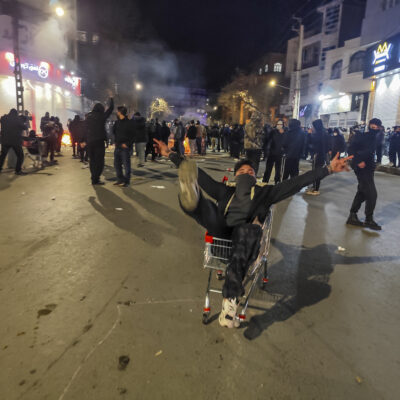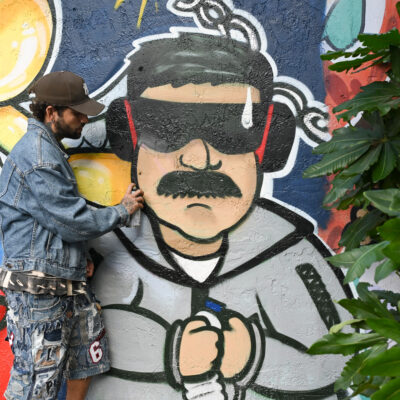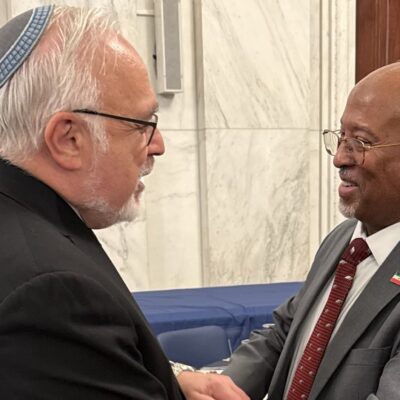
Brontë Wittpenn/San Francisco Chronicle via AP
How deep-blue cities are prosecuting — or not —law-breaking anti-Israel activists
Jewish constituents are frustrated by what they see as progressive prosecutors’ lack of enforcement and accountability when dealing with anti-Israel demonstrators
It was a tale of two freeways.
In April, protesters on U.S. 101 in San Francisco shut down the Golden Gate Bridge and I-880 in nearby Oakland to protest Israel’s military campaign against Hamas in Gaza, blocking traffic for hours. Protesters in Oakland chained themselves to cement-filled barrels to avoid being forced to leave. On the Golden Gate Bridge in San Francisco, the anti-Israel activists used a heavy chain to connect several cars at the front of the logjam.
The story of the two simultaneous protests diverges when it comes to the consequences the protesters on each highway are now facing. In August, San Francisco District Attorney Brooke Jenkins charged 26 people with false imprisonment, trespassing and other charges, alleging that they forcibly kept drivers on the Golden Gate Bridge for more than four hours. Meanwhile, Alameda County District Attorney Pamela Price has not filed charges against any of the protesters who shut down I-880 in Oakland.
The two district attorneys’ strikingly disparate handlings of similar incidents reflect their different approaches to prosecuting crime — and offers a window into how different law enforcement officials have dealt with rising antisemitism since the Oct. 7 Hamas attacks last year and anti-Israel protests that have at times veered into unlawfulness.
Price was elected in 2022 as a staunch progressive who ran on a platform of reducing sentences and limiting incarceration. She now faces a recall in November from community members worried she isn’t doing enough to stem rising crime in Oakland. Jenkins, meanwhile, was appointed San Francisco DA in 2022 after her progressive predecessor, Chesa Boudin, was successfully recalled in a campaign similar to the one seeking to oust Price.
Images of illicit encampments, disruptive protests and videos of activists chanting hateful slogans about Israel and Jews outside kosher restaurants are often met with what seems like a simple demand from Jewish Americans concerned about rising antisemitism: Why isn’t more being done about this?
“People have a right to protest. People have a right to go out and hate as much as you want. This is America. You don’t have to like me,” said Hermann Walz, a former prosecutor in Queens and an adjunct professor at John Jay College of Criminal Justice. “What you’re not allowed to do is trespass, deface property, harass other people, those kinds of things.”
But even when protesters break the law, such as on the Golden Gate Bridge and I-880 in Oakland, what happens to them next — and what consequences they might face for their actions — can vary widely. Prosecutors have discretion in deciding when to bring charges and how severe the charges will be. Just because a person is arrested on the scene of a protest does not mean they will face charges; The New York Times reported in July that more than 3,000 people were arrested at campus protests last spring, the majority of them have not faced any charges or have since had charges dropped.

Sometimes it’s a question of capacity: Does a district attorney’s office have the resources to carry the cases through? Do they have enough evidence from the police? Even still, they may not want to devote the necessary resources to these kinds of cases.
“I think historically, most people who have been arrested at protests have not been prosecuted,” said David Sklansky, a professor at Stanford Law School. “In the protests against the Vietnam War in the 1960s, for example, most of those people who were arrested were not then formally charged and prosecuted in court because the court capacity and the prosecutors’ offices couldn’t accommodate that.”
Often, though, it’s a question of values. Progressive prosecutors such as Price were elected on the promise that they would be more discerning in deciding which cases warrant prosecution, a message that held particular appeal in recent years as greater attention was paid to racial disparities in policing and excessive use of force by law enforcement officers.
“Many progressive prosecutors run on a platform of being less carceral and less inclined to seek criminal sanctions across the board,” Sklansky said. “It wouldn’t be surprising if you see that in cases of protest.”
Since Oct. 7, some Jewish constituents represented by prosecutors who have adopted a soft-on-crime approach are frustrated by what they see as a lack of enforcement and accountability.
In Alameda County, which encompasses Oakland and Berkeley, Price’s hands-off approach to protest-related incidents is just one area of concern for Jewish leaders in the area. She also hasn’t spoken out against some of the most high-profile antisemitic incidents in the area, such as when a Chabad menorah placed in a public park was dismantled and thrown in a lake, with threatening graffiti left in its wake. In early November, she voted for a local Democratic Party resolution that accused Israel of genocide, apartheid, ethnic cleansing and “the war crime of collective punishment.” A spokesperson for Price did not respond to requests for comment.
“I think the Jewish community has been very disappointed in the lack of communication and condemning of incidents that we have seen across the East Bay,” said Jonathan Mintzer, director of government affairs at the Bay Area Jewish Community Relations Council. Price has never contacted the JCRC. Jenkins, for her part, has worked closely with the San Francisco Jewish community to provide updates on relevant prosecutions and speak directly with concerned San Franciscans.
“I would say the majority of the Jewish community has probably lost confidence in [Price’s] ability to build bridges,” added Tyler Gregory, the JCRC’s CEO.
The frustration expressed by Bay Area Jewish community leaders reflects a wider sense of concern among Jewish leaders that prosecutors — particularly those in deep-blue jurisdictions — are not doing enough to fight rising antisemitism.
“We have heard incredible frustration, not just from the community, but from many law enforcement partners, about the lack of prosecution and/or political support to hold people accountable for violating the law,” said Michael Masters, a former chief of staff at the Chicago Police Department who is now the CEO at Secure Community Network, which provides security services and assessments to Jewish organizations.
“It doesn’t appear that the perpetrators of these acts fear the consequences of their actions,” said Richard Priem, CEO of the Community Security Service, another Jewish communal security organization.
Even when people at protests are breaking the law in some way, like trespassing or refusing to disperse when ordered by police, it’s hardly a guarantee that they’ll face charges.
“Whether it’s fair or not fair, accusations of stifling free speech and accusations of cracking down on protests are going to be levied anyways, even if there were real acts and real attempts to break the law,” Priem said.
Philadelphia District Attorney Larry Krasner — who was elected in 2017 as a self-described “progressive prosecutor,” one of the earliest wins for the movement — was a civil rights attorney earlier in his career. This spring, when anti-Israel activists set up an encampment at the University of Pennsylvania, he expressed support for students’ right to protest and criticized Columbia University for its handling of campus protests.
“The First Amendment comes from here, this is Philadelphia, we don’t have to do stupid like they did at Columbia,” Krasner said. The day before, Columbia had arrested several dozen people for breaking into and occupying a campus building. (The charges were later dropped in most cases.) When UPenn police arrested four people for attempting to occupy a campus building, Krasner declined to bring charges.

“He has not been diligent in prosecuting, so the prosecutions have been minimal. I just don’t think he’s been as responsive. We’ve tried to speak with him,” said Robin Schatz, director of government affairs at the Jewish Federation of Greater Philadelphia. “There is frustration on the part of the police and on the part of our security director because there has been a reluctance, when arrests are made, to prosecute.”
Prosecutors’ discretion over whether to file charges against people extends to cases involving more serious actions than just out-of-control protests. In Los Angeles, Jewish community members are upset that no charges have yet been filed related to a June protest outside a synagogue in the heavily Jewish Pico-Robertson neighborhood that turned violent. President Joe Biden called the protests, which blocked entry to Adas Torah synagogue while it was holding an event about real estate in Israel, “dangerous, unconscionable, antisemitic and un-American.” L.A. Mayor Karen Bass condemned the violence and pledged to do more to protect the Jewish community.
George Gascón, the Los Angeles County district attorney, “is not taking antisemitic hate crimes seriously,” said Sam Yebri, a lawyer and activist in the L.A. Jewish community. “The feeling in the Jewish community is that our safety is no longer a priority for our prosecutor.”
Gascón, a progressive, faces what is expected to be a competitive race in November against Nathan Hochman, a former Republican candidate for California attorney general. Hochman shared a video from Adas Torah soon after the violence broke out, saying Gascón is “missing in action.”
“Our office is not aware if any cases have been filed against anyone in this incident,” a spokesperson for Gascón said when asked about the Adas Torah incident. Days later, Brian Schirn, a deputy DA who runs the Narcotics Division, said, for the first time in his three decades in the DA’s office, that he has “no confidence in our office treating a Jewish victim the same as anyone else.”
“You have a right to assemble, but you have to have a time, place and manner, and then bringing weapons like bear spray, etc, to these protests is highly illegal. There just has been, uniformly, no enforcement of these kinds of things,” said Rabbi Noah Farkas, president and CEO of the Los Angeles Jewish Federation.
In all of these cases, some Jewish community members are left wondering why no further action is being taken. Does it stem from a deeper philosophical approach to criminal justice? Is there a blind spot when it comes to Jews’ concerns about antisemitism? Or could it be political, a desire to avoid upsetting constituents on the left?
“The loser of this,” said Community Security Service’s Priem, “is the Jewish congregant, the Jewish person in the neighborhood or the Jewish student on campus who is seeing that certain transgressions that could be acted upon, that could be prosecuted, that could lead to arrest, are tolerated because they’re not severe enough, and there is a hesitancy to draw that kind of scrutiny and criticism from the other side.”






